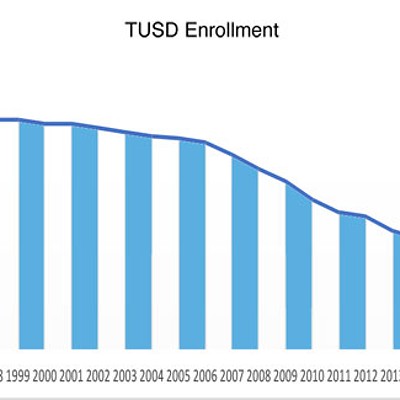Adriana Santiago can't stop looking for a job.
Even though the unemployment checks she's received each week for the past eight months are helping her get by, Santiago isn't willing to sit back and take her time finding work—not when she knows the checks will soon stop coming.
"I might just have to take anything," said Santiago, 37, whose most recent job was as a correctional officer at a state prison in Florence. "I know it's going to run out."
Santiago is certified as a nursing assistant and hopes to go to school to become a licensed practical nurse. She now spends much of nearly every weekday combing through resources available at Pima County's ONESTOP Career Center, at 340 N. Commerce Park. It's a 25-to-30-mile commute that her aging vehicle can't take much more of, but Santiago knows the effort is necessary if she's going to return to the workforce.
"I don't want to live like this," said Santiago, a mother of two who has had to give up custody of her sons while searching for work. "This is not enough for me. I know my (unemployment) is very limited, so I have to look out for something."
Santiago recently received her first extension of benefits beyond the initial 26 weeks that Arizonans who file for unemployment receive. The 20-week extension is one of four tiers of emergency unemployment compensation (EUC) available in Arizona. All told, a displaced worker in this state can currently get up to 89 weeks of benefits.
Congress made an additional 20 weeks of extended benefits available last June, but because Arizona's unemployment rate had decreased, it was necessary that a small change—one word, to be exact—be made in state law in order for Arizonans to be eligible for the extra payments. The change involved basing Arizona's unemployment rate on a three-year average instead of two years.
Gov. Jan Brewer called for a special legislative session on the matter—but ultimately, no vote was taken.
More than 13,000 Arizonans had their unemployment cut off last June as a result of the legislative inaction, according to Kevan Kaighn, a spokesman for Arizona Department of Economic Security. An additional 49,880 people saw their benefits run out between July 2011 and January, Kaighn said.
Arizona is one of 20 states that didn't change its laws to remain eligible for extended benefits, said Mark Darmer, deputy assistant director for the Employment and Rehabilitation Services division of DES.
Darmer said an additional 9,000 Arizonans will likely be dropped from the unemployment rolls this summer if the state's jobless rate continues to decline, because Congress' recent extension of the EUC program has unemployment-rate triggers attached to each tier.
The state unemployment rate was 8.7 percent in March, down from a peak of 10.9 percent each month from November 2009 to March 2010. Arizona will lose its fourth tier of benefits in June if the rate remains below 9 percent, Darmer said.
"We believe by June, we will trigger off that tier, which will impact more people," Darmer said.
It's a Catch-22 for Arizona: As more people return to work, some of the benefits available to those who can't find a job go away. And those who file for benefits for the first time will find themselves eligible for help during a much shorter time period, down to a maximum of 63 weeks by the end of 2012.
"They say I get a year, but I don't know," said Carlos Robles, 42, an out-of-work driver who got his first unemployment check in late February. "I can't survive on this right now. Without it, it'd be much worse, though."
Robles said he's hoping to get a grant that will enable him to go to school to get his commercial driver's license. Until then, he'll continue to look for work, but doesn't expect to find many options.
On a recent weekday morning, dozens of displaced workers filtered through the ONESTOP office, proof that many are still out of work despite the dip in the state's unemployment rate. The fact that people are trying to learn skills that will help them become employed again disproves the notion that people collecting unemployment make no effort to get off it quickly because they're "too lazy to go back to work," Darmer said.
Arizona's maximum weekly unemployment benefit is $240, before taxes. That's an average of $6 an hour, based on a 40-hour week, well below the state's minimum wage of $7.65 per hour. But for many unemployed people, the income that a minimum-wage job brings would quickly be eaten up by the expenses of going to work, such as child care and transportation, Darmer said.
"Those people who are on long-term unemployment ... they may have been in some of those higher-paying jobs. To just assume they should go back and take a minimum-wage job instead of staying on unemployment is unfair," Darmer said.
Darmer said his office is trying to get the message out to employers that Arizonans who are collecting unemployment deserve higher-paying jobs, not just jobs at the bottom of the wage scale.
"They should look at them as viable candidates for their jobs," he said.












